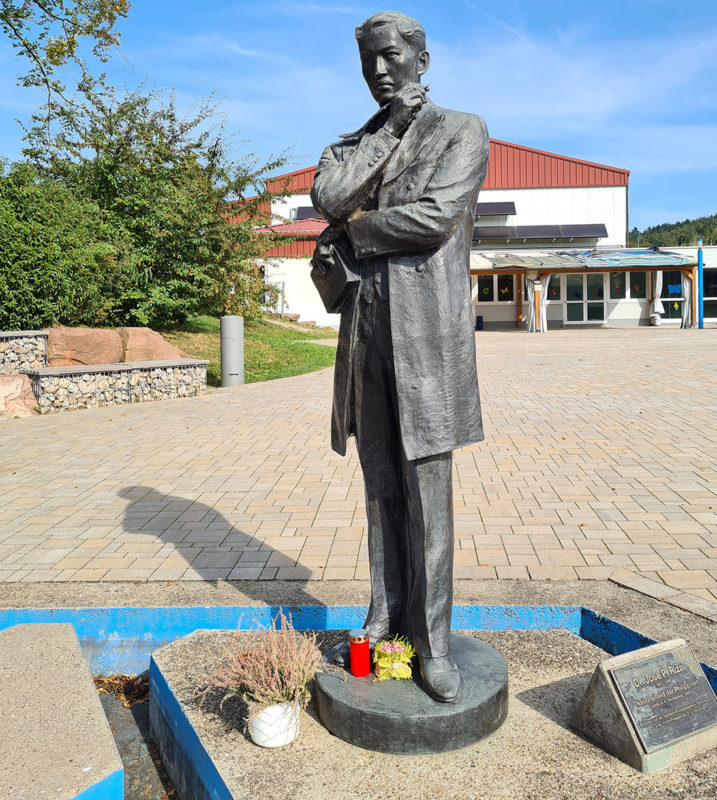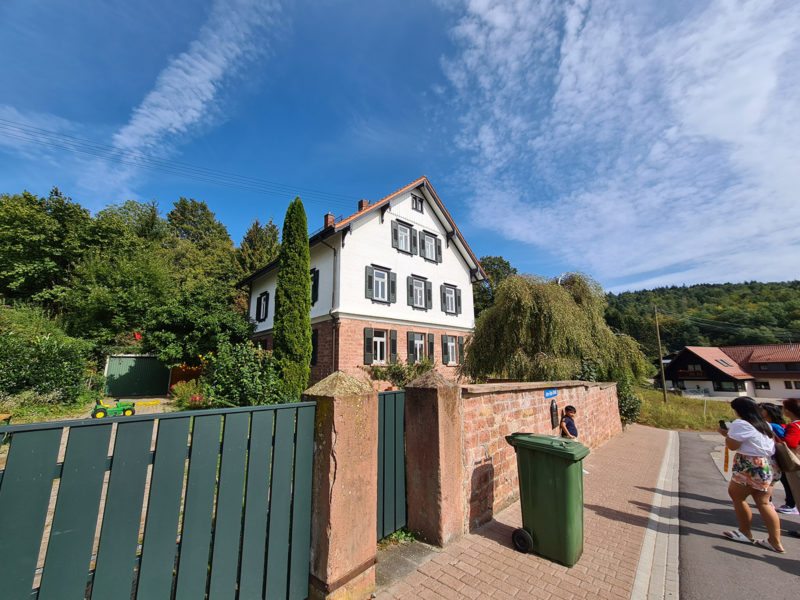 BERN, Switzerland (MindaNews / 25 September) – Little do Filipino visitors to Germany know that there is a Rizal Park and even a Jose Rizal Street in Germany, built by Filipinos and Germans alike to honor Rizal’s stay and friendships made in Germany and in appreciation of his German scholarship.
BERN, Switzerland (MindaNews / 25 September) – Little do Filipino visitors to Germany know that there is a Rizal Park and even a Jose Rizal Street in Germany, built by Filipinos and Germans alike to honor Rizal’s stay and friendships made in Germany and in appreciation of his German scholarship.
Our small group of six Filipinos and a Filipino-German set out last week from Heidelberg in southern Germany, the famous university town where Rizal had studied ophthalmology in the year 1886. Without much difficulty using a GPS, we drove through low hills and small forests and found the Rizal Park in the quaint town of Wilhelmsfeld, some 12 miles away from Heidelberg. Rizal is posed with a quill in his right hand touching his face slightly, in deep thought with a far gaze.
The larger-than-life bronze statue was made by a Filipino sculptor, Anastacio Caedo, in Manila; the park was opened in 1978 but redesigned in 2003 to include the busts of four people who strongly influenced Rizal in his travels in Germany.

A site marker praises Rizal as “extensively educated, widely travelled and an exceptionally gifted linguist” and extols his “exemplary social and political commitment reflected in his work as a doctor, writer and artist.”
In Heidelberg, Rizal had studied the German language; attended lectures in ophthalmology as an observer at the Alte Universitat (Germany’s oldest university founded in 1386), and trained under two outstanding ophthalmologists in the university eye-clinic, according to an article written by Ramon M. Roda, a retired professor of Spanish and Rizal course in Manila who had visited Heidelberg in 1998.
A page from the Geocities Archive Project reveals the humble life that our national hero lived as a student in Germany. Certainly not a luxurious life, as one of his archived letters show: “..Tomorrow I am going to change my residence and move to No. 12 Ludwigsplatz, near the University. The room alone with service, light, and heating costs me eight pesos a month or 32 marks, each mark is worth 2 reales fuertes. If we were in the midst of winter, it would cost me more for I would have to spend for the heating. I shall eat at the restaurant during the day and at night take supper in my room in German style, that is, a cup of tea, bread, and butter. I believe that in this way I can live on 25 pesos a month with board and lodging until the end of April when I expect to receive my monthly allowance.”
It was in these lonely conditions that Rizal wrote “A Las Flores de Heidelberg,” a poem extolling the town’s natural bounty but also expressing his nostalgia for the Philippines.
In Heidelberg, Rizal met Pastor Karl Ullmer, a Protestant, who later became one of Rizal’s devoted friends. Rizal spent three months in Wilhelmsfeld as a house guest of the Ullmers.
Geocities Archives reveals the contents of a letter dated April 24, 1886 that Rizal wrote (in German) in reply to Pastor Ullmer’s offer: “…I have been told the people of Wilhelmsfeld do not speak a correct German, rather a dialect. Although being afraid to misuse your kindness please allow me to stay in your house if possible rather than being with other families.”
“Your friendship is very precious to me and this would imply that I live with a charming family and practice German on a high standard which I consider to be a main point. In case this should prove to be impossible or inconvenient I can take any room you choose and know it will be good for me.”
And so this was how Rizal got his room, the rightmost on the second floor of the 3-story house which remains in good condition to this day. The house marker says it was here in this house that Rizal completed the final chapters of his novel “Noli Me Tangere”. Rizal also celebrated in the house his 25th birthday with his German hosts (the modest affair was toasted to strawberry punch).
The current German occupants of the house graciously pointed out to our Filipino group the window of Rizal’s room. The house – painted in white with grey shutters and a red sandstone foundation – stands right in the corner on Jose Rizal Strasse, a long street which ends in one of the expansive farms of Wilhemsfeld.
There we were, a group of Filipinos trying to reflect on our national hero’s stay in Germany more than a century ago. There are few visitors to the park—maybe a group or two of Filipinos spurred on by curiosity over this unlikely testament to Rizal in a faraway European country. But the respect and admiration of Germans is clear for this scholar who learned their language and way of life and appreciated their culture and natural beauty.

They admire it that Rizal translated “Wilhelm Tell,” the work of Friedrich Schiller, a German poet, into Tagalog. In Wilhelmsfeld he wrote the last chapters of “Noli Me Tangere,” the book of the Philippine Revolution. While living in Wilhelmsfeld, he made long walks (12 kms or about 3 hours) through the forests and hills to attend his studies at the university. He talked to Protestant and Catholic priests and experienced religious tolerance and saw the ways of the simple country people.
Rizal left Wilhelmsfeld and Heidelberg in the late summer of 1886, and went to Leipzig and Berlin, where “Noli Me Tangere” was published. On his eventual return to the Philippines, Rizal tried to convey to his people some of the ideas and influences he had found in Germany.
“His experiences in Germany caused him to put so much emphasis on education, diligence, democratic and civil rights, through which he wanted to achieve freedom for his country and its people,” according to the Geocities Archives.
The retired professor Ramon Roda, meanwhile wrote that in naming a plaza for our national hero in Wilhelmsfeld, the people of Heidelberg was “honoring the memory of a man of letters and science, who, with courage and generosity and brotherhood, struggled until death for the moral and intellectual advancement of his people.” (Brady Eviota wrote and edited for the now defunct Media Mindanao News Service in Davao City and also for SunStar Cagayan de Oro. He is from Surigao City and now lives in Bern, the Swiss capital located near the Bernese Alps)







